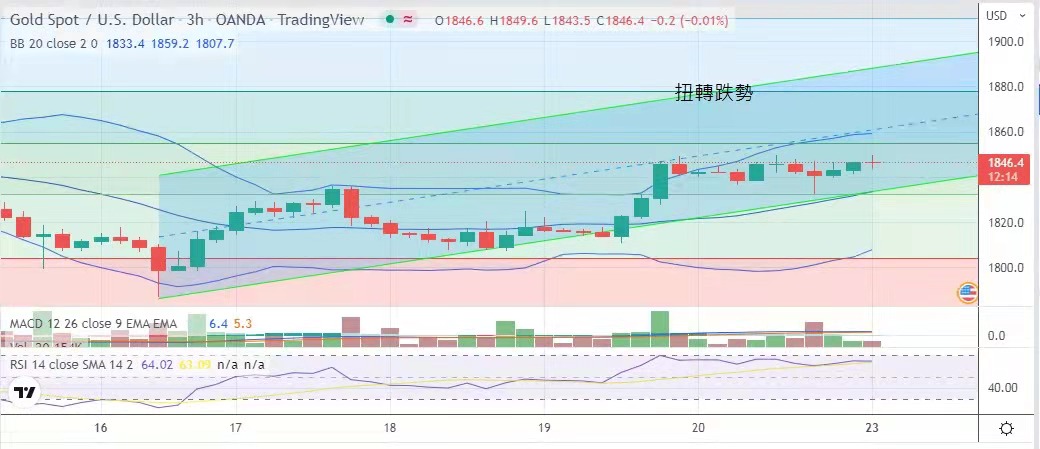Risk paradise
May 23rd
Today's volatility range:
The war in Ukraine continued, which led to the high prices of natural fuel and food, and at the same time, inflation increased, which increased the global economic burden. Central banks all over the world unanimously launched the policy of raising interest rates to control inflation.
The level of interest rate reflects the cost of holding gold, but the rise of interest rate is also like a double-edged sword. At the same time, it hits the risk market and leads to the demand for hedging. The price of gold has digested the rising interest rate in the past two months.
Last week, the gold market reversed its decline for four consecutive weeks, and this week's outlook is improving. The suggested volatility today is $1,838 to $1,855.
Affected by the epidemic, China's economic data was inferior last month, and Hong Kong stocks fell first and then rose last week. Last week, it was shown that China was reducing its holdings of US Treasury bonds, and its total holdings fell to 1.039 in the first quarter.
Trillion dollars, the lowest in 11 years. The dollar has fallen, the renminbi has strengthened relatively, and the Mainland Development and Reform Commission has threatened that the epidemic situation in China will gradually pass. Investors expect that the economic operation will return to normal, and the market
The improved atmosphere, coupled with the mainland central bank's reduction of the 5-year official quotation rate to 4.45% on Friday, stimulated the Hang Seng Index to rise by 818 points or 4.11% and close at 20,717 points. Russia invaded Ukraine by force.
Since then, the war has amplified the inflation in Europe, because these two countries were originally the two largest suppliers of natural fuel and food. Yesterday, British data showed that due to food and energy prices
Soaring, and the inflation rate rose to 9%, the highest in 40 years, in April.
Investors are worried about the negative impact of inflation on corporate profits. All three major European stock markets fell, and the German DAX index fell by 0.33%. Paris CAC index fell by 1.22%; Britain's FTSE 100 index fell 0.38.
%。 Last week, the economic data of the United States did not perform well. The manufacturing index of the new york Federal Reserve recorded a negative growth of 11.6%, which was much lower than the expected growth of 17% in the market. The labor data was also poor. The number of new applicants in the United States last week was the same.
It reached a new high this year, reaching 218,000, higher than the market expectation. In addition, the Philadelphia Federal Reserve Manufacturing Index was released yesterday, with a figure of only 2.6 points, far below the market expectation of 16 points. Plus high inflation
Enterprises and markets are worried that under the effect of interest rate increase by the Federal Reserve, U.S. stocks have stepped into a bear market, and the Dow Jones index, which represents the traditional economy, has fallen for eight weeks in a row, setting a record for the longest market decline since 1923. The Standard & Poor's 500 Index and Nasdaq.
The composite index fell for seven consecutive weeks, falling by 3.05% and 3.82% respectively.
U.S. labor and manufacturing data are dragging at the same time, the economic recession is lingering, and investors are worried that the Federal Reserve will raise interest rates to fight off high inflation, which will further plunge the U.S. economy into recession. Last week's dollar exchange
Both the price and the yield of one-year government bonds fell, and with the decline of European and American stocks, gold became a haven for safe-haven funds. The lowest price of gold last week was $1,786, and the highest price was $1,849.5, closing at $1,846.6.
In a week, the price of gold rose by $35.1.
For detailed analysis and operation suggestions, please CLICK the following link to join the group and ask the administrator.
https://t.me/mingtak
Previous Article Next Article


 Whatsapp
Whatsapp Telegram
Telegram

